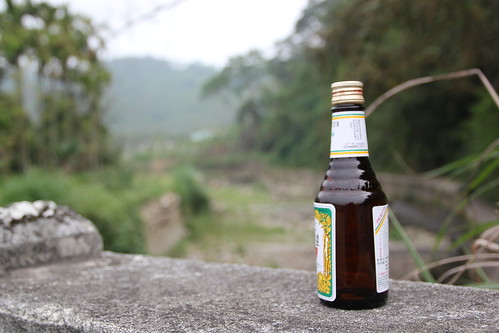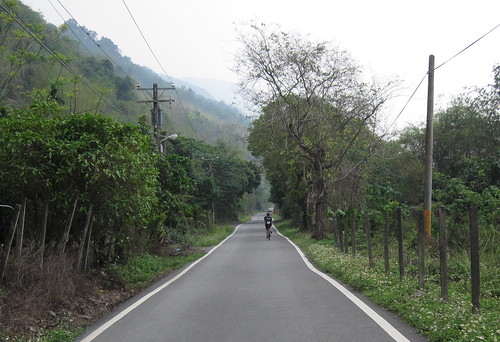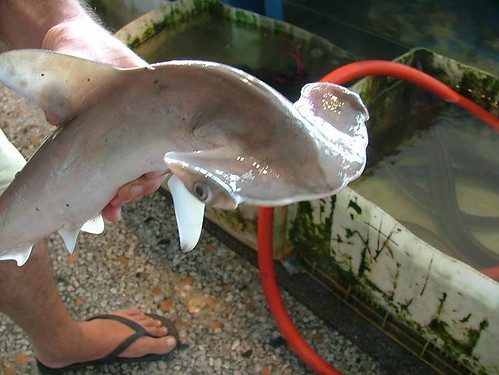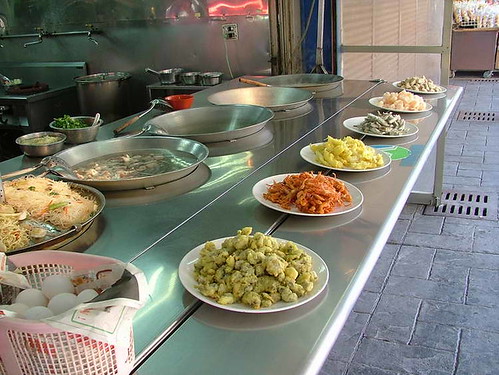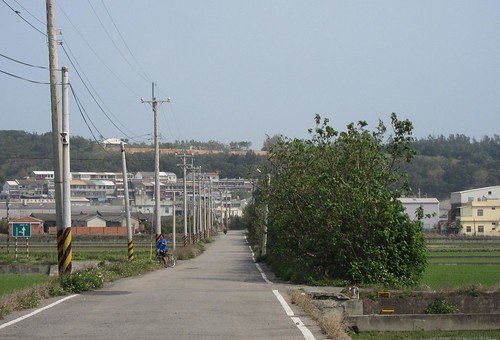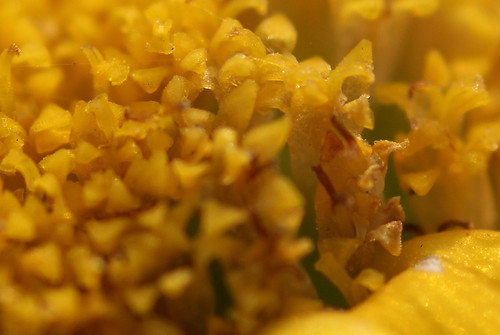Recall that President Ma himself has said that the services pact with the Borg (slogan: "You are Chinese; we will assimilate you") will create only 12,000 jobs. I got to wondering how much investment that represented. Fortunately MOFA has already told us in that
letter they sent around.
As of the end of January 2014, the government had approved 495 mainland Chinese investment cases, with investment of US$870 million. The mainland company officials, specialists and family members who have come to Taiwan in association with these cases number just 264, while these firms have provided jobs for 9,624 Taiwanese.
US$870 million divided by 924 = $90,400 of investment per job. For 12,000 jobs, that's a total of just over US$1 billion, or 1/200th of Taiwanese investment in China. So the government wants to sell Taiwan to China for an additional billion of investment. May as well sell it for $24 and be done with it...
Inside the Sunflower Movement: Ian Rowen, whose scholarly piece on Chinese tourism here I will hopefully have a chance to look at this weekend, says that the kids are alright:
Indeed, mainland Chinese and Hong Kong students joined their classmates inside the occupied parliament from nearly the beginning of the movement. Tian’anmen protest leaders Wang Dan and Wu’er Kaixi entered the compound the second night to express their support for the students. And people from Shanghai to Brazil connected through rapidly developing ad hoc volunteer crews using new media channels like Facebook, Google, LINE and more.
Sunflower sympathizers in Taiwan and beyond turned their Facebook profile pictures black in solidarity. A collaborative online platform, g0v.today, was set up via Hackpad to consolidate and update information and video feeds in both Chinese and English. As of Monday it had over 1,900 collaborators.
As much as these tools have enabled activists to spread their message, they have also been used to smear students. Within Taiwan, volleys of text messages were sent attempting to link Black Island student leaders Chen Wei-ting and Lin Fei-fan to the opposition DPP’s past presidential candidate, Tsai Ying-wen, a legal scholar and past official who has largely stayed out of the fray.
Meanwhile, information outside of Taiwan has been surprisingly hard to access. Across the Strait, most of China remains behind the Great Firewall, with little to no coverage in state-owned media. Globally, posts to Reddit, Youtube, and other influential sites coming from within and beyond the Occupied Parliament seem to have been professionally down-voted, manipulated by forces few fully understand.
The whole thing is long and excellent. Rowen does not say that the DPP is controlling the students -- he shows the nature of DPP legislator's involvement in that piece. If you think Rowen is too sympathetic,
Cindy Sui of BBC discussed how they are distant from both parties. I have not noticed in her many pieces on Taiwan that she is particularly pro-Green, and of course BBC itself, as I have observed on many occasions, is strongly pro-China). One of the KMT conspiracy theories is that the DPP is controlling the students (a retired pro-KMT college professor spews all the KMT propaganda tropes
here, they are "professional students" etc. It's high comedy, and the person who translated it must have been in stitches. Note that the title, subversively, is a Monty Python reference.). Speaking of the students, they were
on Reddit the other day, very creditably. For example:
The cost of this trade pact, simply put, will be our freedom and the future of our country. It sounds like an exaggeration, but it really isn't. On the economic front, our economy is already 38% reliant on China, with China only 2.5% for us. This is unbalanced. And you can probably imagine the impact of this on our democracy, our freedom of speech, etc, especially China's stated aims is to use its economic ties to impact our political system. This trade pact will increase this unequal dependency further in the future, maybe not in 1 or 2 years, but definitely in 10-20. And we fear that this will be a course we cannot reverse in the future.
The Reddit discussion is strongly focused on exactly those aspects that are needed -- the trade pact is unfair, it is undemocratic, it is a neoliberal sellout, and it will do little for the economy of Taiwan. The struggle against it is part of the global class struggle. The students are well aware of what is at stake. They are obviously not dupes.
Speaking of neoliberal sellout, Peter Lee at Chinahand has
a piece on the students that offers some good points but is marred by errors and misunderstandings. Dead on:
The CSSTA opens various Taiwan and PRC service industries to mutual investment. It is a piece of neo-liberal free trade bullshit whose advantages to Taiwan’s economy have probably been oversold. It will provide some windfall profits for some Taiwanese fat cats in the financial services sector as PRC money floods in, but will probably do little to boost wages and employment, or get the Taiwanese economy out of its overall economic rut.
But then there's this:
Fatally, the inter-party negotiations were put in the hands of the speaker of the legislature, the KMT’s own Wang Jin-pyng. Wang a native Taiwanese politician from the DPP’s southern stronghold and a failed presidential candidate, turned out to be a KINO (KMT in Name Only), and for reasons either of principle, ambition, or cussedness, concluded a generous agreement with the DPP that allowed for a series of 16 public hearings followed by a line-by-line review of the agreement in the Home Affairs Committee.
The DPP, which loathes the unilateral outreach of the KMT to the mainland and longs for a politically advantageous crisis, seized the opportunity Wang gave them to drag out the public hearings for over six months, even though the constitution stipulates that any executive order that isn’t acted on by the legislature automatically takes effect after three months. [MT: Lee errs here. The treaty is not an executive order and doesn't fall under that article, though the KMT has tried to make that work.]
Lee doesn't understand Wang at all. At the moment the KMT has three basic components: the Old Guard mainlanders, the Ma faction, who are also right-wing nationalist mainlanders but are hated by the Old Guard, and the Southern KMT, the term for the Taiwanese legislators who are KMTers. Wang is often portrayed as the leader of the Southern KMT. But let's remember that when Wang ran for KMT chairman against Ma, the Old Guard supported Wang. Wang is not some subversive Taiwanese leader of the anti-Ma Taiwanese opposition in the KMT as Lee attempts to depict him. Rather, he's the tongs by which the mainlander Old Guard handles the Taiwanese KMTers; he unites the two groups.
He's an insider. Wang is a master politician, compromiser, and horse trader. It was this aspect of his political abilities that resulted in his willingness to drag out the trade agreement, he must horse trade with the DPP, and of course, the fact that the Southern KMT doesn't want to vote for it and probably doesn't support it.
Consider this. Legislators all over Taiwan represent factional and clan networks that are heavily intermingled with local organized crime businesses. Organized crime is in the service business. They run services like gambling, prostitution, and loan sharking, but also legitimate service businesses like hair salons, bus companies, and schools. Chinese who come over and open services are going to compete directly with ordinary Taiwanese, for sure, but also with local organized crime elements of local political factions. The services pact is a dog supported by 20% of the population, and it will directly hit the business relations of many local legislators.
Why are they voting for it? Well, Ma the pro-China ideologue wants it and his faction is running the KMT. They means they control the resources from (1) the central government, resources used to reward local patronage networks with flows of government cash and (2) party resources for getting legislators re-elected. Now you understand why Ma remained as party Chair. Ma is in a position to prevent the re-nomination and election of KMT legislators and compel them to vote for the pact against both common sense and their own interests. That is why the students have demanded that Ma lift that pressure and allow the legislators to vote their
consciences interests.
Lee then attributes all the action to the malign conspiracies of the DPP -- after criticizing the DPP for being conspiratorial Lee then engages in conspiracies of his own. His discussions of the DPP should probably be ignored; his discussion of Dave Brown's letter in the Nelson Report and the DPP's response is inane (I point out the many problems with Brown
here). Lee's gin-soaked expat disdain for Taiwan and its democracy makes the piece hard to read; alas, as an analytical standpoint, disdainful cynicism will lead one astray, as it does in this case (Lee
wrote an apologetic for the deployment of pro-PRC gangsters in a piece at Asia Times/Counterpunch a couple of weeks ago, at least this time they come under his general disdain). But at the bottom he makes a good point I've been making for some time about US Taiwan policy:
If the DPP does gain the presidency in 2016, the PRC will be facing an interesting situation in which four of the Asian democracies—Japan, Taiwan, Philippines, and India—are committed to a policy of resisting the PRC’s eastward military and economic expansion and preferentially developing their own China-excluding economic and security order.
US Taiwan policy is at odds with its policies elsewhere in Asia. Everywhere else, it is committed to resisting PRC expansion (in fact it was just complaining about China's treatment of Manila this week). But in Taiwan, US policy is committed to helping Chinese expansionism. Say what?
This US position is even more harshly if implicitly critiqued in Cole's
Say Goodbye to Peaceful Unification. Of course we've all been saying for years that the island would go crazy if Ma ever made a deal that handed Taiwan to the PRC. And Sunday was a demonstration a half a million strong, a small taste of that. US policy is inexplicably retrograde: here is a whole island of people who don't want to become part of the PRC and US policy at the moment is to coddle the PRC and brush off potential allies.
Meanwhile, in contrast to Lee, John Tkacik presents the POV of someone who really loves Taiwan in the
Washington Times.An excellent piece, it also explains the problems with the pact very clearly. But it is symptomatic of the increasingly bizarre US domestic media world where this protest is completely unreported:
a soft blackout. The piece appeared in the Washington Times, not exactly a mainstream paper. The mainstream media in the US is awful, so bad I've had people contacting me to ask if Taiwan is safe to visit, because no one knows what is going on. Indeed, someone posted a graphic of CNN the other day on Facebook -- lead story was Chile earthquake, next
SIX stories were about the Malaysian aircraft that went missing. I wish those gremlins that stole the aircraft would return it so that story would die. Europe is better, as always: the Guardian also has
a pro-Taiwan piece, and I've heard Le Monde has good coverage.
Speaking of Dave Brown,
my piece on that letter is, at the moment, second below Brown's Johns Hopkins webpage when you search "Dave Brown Taiwan". Brown's inept letter was widely reported in the Taiwan media. The traffic spike I got from that is unreal. Apparently Alan Romberg has ripped the movement in the Nelson Report as well (UPDATE: Not as bad I thought); all the reliably pro-KMT US commentators are being mobilized. Nat Bellocchi
supports the students in the Taipei Times. Meanwhile in
The Wall Street Journal Rupert Hammond-Chambers argues that the US needs to enhance its economic ties with Taiwan. Its conclusion:
By publicly declaring its backing for Taiwan's bilateral and multilateral economic ambitions—including a bilateral investment agreement with Washington and a path to participation in TPP—the U.S. would lend invaluable support to peace and stability cross-Strait relations. The U.S. would help ensure that Taiwan's domestic debate on China policy takes place not just in the shadow of a rising China, but amid expanding Taiwan ties with trade partners around the globe.
Meanwhile, recall that one of the student demands is that there be a mechanism for oversight of cross-strait pacts prior to passage and implementation of the Services Pact. The Ma Administration
unveiled one yesterday.
The Services Pact is exempt.
________________
Daily Links:
_______________________
[Taiwan] Don't miss the comments below! And check out my blog and its sidebars for events, links to previous posts and picture posts, and scores of links to other Taiwan blogs and forums!
